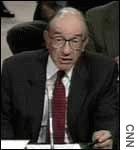|
Fed chief takes long view
|
 |
September 20, 2001: 2:30 p.m. ET
Greenspan sees long-term U.S. economic strength in wake of attacks
|
NEW YORK (CNNfn) - The U.S. economy is strong enough to survive the short-term impact of the worst terrorist attacks in U.S. history, Federal Reserve Chairman Alan Greenspan told Congress Thursday.
"The shock of September 11, by markedly raising the degree of uncertainty about the future, has the potential to result, for a time, in pronounced disengagement from future commitments," Greenspan said in prepared testimony before the Senate Banking Committee.
|

|
VIDEO
|
|
 CNNfn's Kathleen Hays takes a closer look at Greenspan's testimony to Senate Banking Committee. CNNfn's Kathleen Hays takes a closer look at Greenspan's testimony to Senate Banking Committee. |
|
Real
|
28K
|
80K
|
|
Windows Media
|
28K
|
80K
|
|
"But as we struggle to make sense of our profound loss and its immediate consequences for the economy," Greenspan added, "we must not lose sight of our longer-run prospects, which have not been significantly diminished by these terrible events."
Also appearing before the Senate committee were Treasury Secretary Paul O'Neill and Securities and Exchange Commission Chairman Harvey Pitt. All were discussing the economic impact of last week's terrorist attacks that destroyed the World Trade Center and damaged the Pentagon near Washington, D.C., killing thousands.
After the attacks, the Fed cut its target for short-term interest rates for the eighth time this year in an effort to reassure nervous stock markets that it was ready to pump as much money into the economy as necessary to keep it afloat.
Greenspan did not indicate whether or not the Fed would cut rates again, but most economists expect it will do so at or before its next policy meeting, scheduled for Oct. 2.
"There is a greater degree of uncertainty, and stability will need to be restored," said Ian Morris, chief U.S. economist at HSBC Securities. "So that implies that they'll cut rates if they have to restore that stability."
Click here for more on the Fed and rates
The Congress has also helped with policy moves of its own, sending a $40-billion relief package to President Bush, which he signed just days after the attack.
But Greenspan warned lawmakers they should be careful before making other fiscal policy decisions in the wake of the attacks.

|
|
|
Fed Chairman Alan Greenspan testifying before Congress Thursday. | |
"I would strongly suggest that, while there is an obvious strongly desired sense to move rapidly, it's far more important to be right than quick," Greenspan said. He recommended a waiting period of at least 10 days before making further policy moves.
He pointed out that the U.S. economy was showing signs of recovery in the weeks before the attacks, with hints of an end to a year-long manufacturing recession. He even contradicted the Fed's 'beige book' report, released Wednesday, which said consumer spending was stagnant in August and early September, by saying consumer spending was still strong.
"The system was holding up ... the American economy kept getting battered and battered and battered and it was still standing and indeed, as of Sept. 10, it was still standing," Greenspan said.
Still, he acknowledged weakness continued in manufacturing, the labor market and business spending. Most economists think these weaknesses left the U.S. vulnerable to fall into a recession, however brief or shallow, in the wake of the attacks. 
- from staff and wire reports
|
|
|
|
|
 |

|

